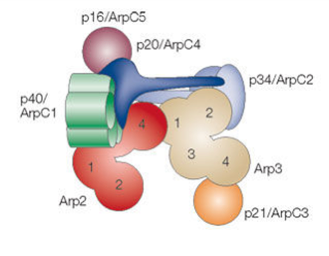Role of the Actin-Related Protein Complex 1B (ARPC1B) in neutrophil antimicrobial function
This project investigates the role of the Actin-Related Protein Complex 1B (ARPC1B) in neutrophil antimicrobial function.
ARPC1B is an important component of the regulatory proteins of the ARP2/3 actin polymerisation complex (Fig 1).

Figure 1. The Arp2/3 complex is one of the major protein complexes in actin polymerisation and cellular motility.
This consists of 7 polypeptides, two actin related proteins of the Arp2 and Arp3 subfamilies and 5 regulatory subunits which includes ARPC1.
Patients with ARPC1B deficiency display unusual susceptibility to bacterial infections; develop skin lesions associated with small blood vessel vasculitis and have defective F-actin polymerisation.
Recently three cases were reported of a deficiency in ARPC1B and presently we have diagnosed a fourth case of this deficiency with a novel mutation in the ARPC1B gene.
Neutrophils from the patient while showing defective actin polymerisation and chemotaxis response produced a normal respiratory burst and were able to phagocytose and kill bacteria effectively.
In addition our preliminary data shows that complement receptors cannot be released from specific granules to the surface of the cell in ARPC1B deficient neutrophils.
To gain a clear understanding of this discrepancy and assist with the clinical evaluation and management of patients with this deficiency, we propose to establish a neutrophil cell line which is deficient in ARPC1B to try to resolve the issue.
Human HL-60 cells will be cultured in the presence retinoic acid to induce development into neutrophils. HL-60 cells which have had their ARPC1B gene knocked out using the CRISPR-CAS9 genome editing system will be generated to examine the role of this regulatory protein on neutrophil responses.
It is proposed that deficiency in phagocytosis and microbial killing will be evident when cells are subjected to priming for increased anti-microbial activity.
If you have an interest in a specific area of immunopathology, please contact Professor Tony Ferrante to discuss potential honours projects.

Supervisor
Research area: Development and genetic immunology, immunopathology
Recommended honours enrolment: Honours in Molecular and Biomedical Science
